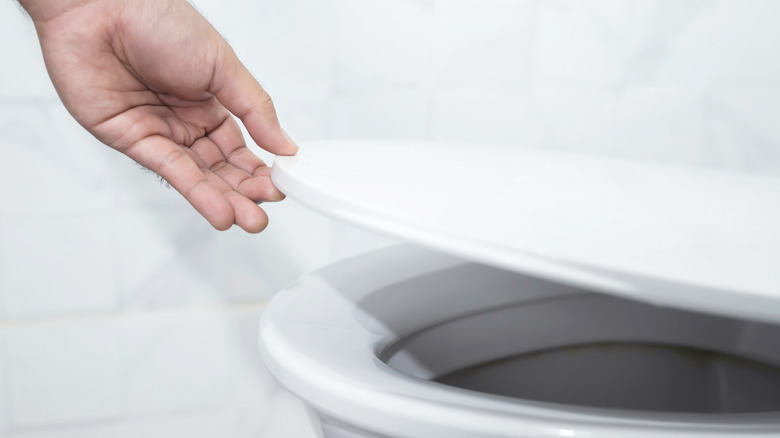What It Means When You Have Orange Urine
Urine can tell a lot about your health, and any changes in its color could be a red flag. If you're healthy and well hydrated, your pee should be a pale straw color or a transparent yellow. Clear urine, on the other hand, might be a sign of overhydration, whereas light orange, amber, or honey-colored urine could indicate dehydration. Colors such as pink, orange, red, or brown may indicate an underlying condition, explains UC San Diego Health.
The yellow color of urine is due to a chemical called urobilin, which results from the breakdown of old red blood cells. Some foods and medications have strong pigments that may cause your pee to turn black, pink, orange, blue, or other colors, suggests UC San Diego Health.
"Beets can produce beeturia, which is when urine becomes tinted pink or red from eating beets or drinking beet juice," said nutrition expert Frances Largeman-Roth in an interview with POPSUGAR. Similarly, fava beans may turn your urine brown. If you eat asparagus or take B vitamins, your urine may appear green.
Orange urine can result from a diet rich in beta-carotene, notes POPSUGAR. This compound occurs naturally in carrots, tomatoes, squash, and other fruits or vegetables.
But if you've been having orange urine for days in a row, it might be time to call your doctor. Sometimes, abnormal urine colors can be a sign of disease and require further investigation.
Possible reasons you might have orange urine
Imagine going to the loo and noticing that your urine is orange. The story repeats itself a few hours later and the next day. First, think about what medications you take. Sulfasalazine, rifampin, laxatives, and other drugs can give urine an orange hue, notes Healthline. Dehydration may cause this problem, too, but there are cases where orange urine can be a sign of something more serious.
For example, pancreatic cancer may cause jaundice, a condition that causes the urine to turn dark yellow or orange, explains NHS Inform. In this case, you may also experience other symptoms, such as yellowing of the skin and eyes, stomach pain, nausea, or changes in bowel habits.
Jaundice can have a multitude of causes, from hepatitis and chronic liver disease to parasitic infections, says the Icahn School of Medicine at Mount Sinai. Therefore, any of these conditions can change your urine color.
Orange urine may also be due to certain dietary supplements, such as vitamin C, notes the Cleveland Clinic. This symptom may also occur in those who take large doses of riboflavin, or vitamin B2, according to Harvard Medical School.
Carrot juice and other foods or beverages with strong pigments have a similar effect. In such cases, your pee should return to a lighter color after you change your diet or stop taking the supplements responsible for this symptom.
If you notice orange urine, UC San Diego Health recommends reaching out to your doctor to figure out the cause.


